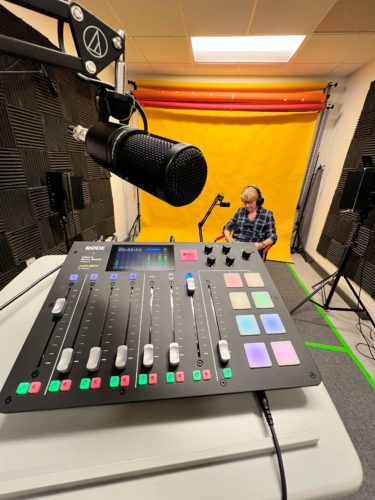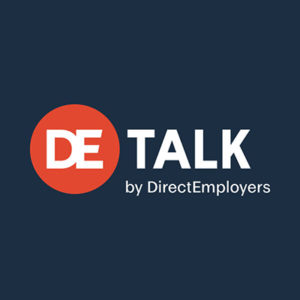
Executive Director Candee Chambers in studio recording Episode 8 of the DE Talk Podcast.
It’s safe to say that the pandemic has transformed many things, including the way people view employment which has led us to the present day and the rapid rate of resignations. While employers struggle with how to retain talent, this shift has caused many employers to look inward and analyze everything from benefits, recruitment, and culture changes to accommodate today’s job market. DirectEmployers Executive Director Candee Chambers sat down with Indianapolis-based entrepreneur, author, and podcaster Lorraine Ball to discuss strategies for shifting from the Great Resignation to the Great Retention. Below you’ll find a snippet from their conversation:
Candee Chambers:
So anyway, we could probably chit chat forever, but let’s shift gears a little bit. The Great Resignation you hear everybody talk about. It feels kind of like doom and gloom. But I’m sure it can be difficult for a lot who struggle to fill their open jobs, a lot of employers. But it does create that opportunity for employers to reevaluate their own workplace cultures, their practices, priorities, and to focus on retaining that top talent. So what do you think, or what have you heard that the reasons employees are citing for leaving the workplace in the first place?
Lorraine Ball:
Well, I think on the one hand, there’s a level of burnout. Really and truly, I think a lot of the reasons are very similar to things I’ve heard before. They feel underappreciated, they’re not challenged by what they do. And I think you have to look at maybe not why people are leaving, but why do they stay? And when you talk to people about why they stay, and I think this is really the lesson for companies is. I love the people I work with. I love the culture. Well, what makes up culture? And I think a lot of managers think that it’s their job to create the culture. And I think really when you turn it around on the team and you ask them what they want, or you ask them that very question, why do you work here? Or, if you could sum up who we are in three words, what would you choose? And then, listen.
Lorraine Ball:
I started the business when it was just me and I had three phrases that I thought described the company I wanted, to build creativity, collaboration, and positive energy. That was what I wanted. And so I sometimes didn’t tell new employees right away that was sort of my core. And I let them experience the culture for a while. And then we would have that conversation. And it’s so interesting that 10, 15 years into the business, those same synonyms, maybe not exactly those words, but those synonyms were still part of who we were because as people came on board, we kind of embraced them, there was a way of interacting, there was a way of treating customers and each other that just perpetuated that. But the employees, also over time, had some phrases that I never, never really envisioned as part of what I did, but they were passionate about it. And instead of saying, no, no, that’s not what we were about, when faced with three people who’re like, “Lorraine, this is what the company’s about.” I’m like, “Okay, I guess this is what the company’s about.”
Candee Chambers:
And again, I wholeheartedly agree with your comment. You really need to listen. And my favorite phrase is, “Listen to hear, don’t listen to respond.” Really listen to what people are saying. And I have this kind of a quote requirement that if there’s a problem, by all means, come and tell me about the problem, but don’t ever come in without a proposed solution because I want to hear you’re the expert in that area or whatever area the problem might be. But if it’s a real problem, I know that when I think of something that should be fixed at home, I’ve got a thought of how I’m going to fix it, and that’s worked really well. I think people do need to feel like they’re being listened to.
Candee Chambers:
I was laughing when you first started talking about culture. I think back to 20 years ago, as you were mentioning earlier, when people would say this is going to be our culture. And I would say, you find it as silly as I do. It’s like, no, that’s not what builds a culture. You have to work together to build your culture. Your LinkedIn article covered a lot of those topics as well that you were just talking about and taking responsibility for your team’s satisfaction and always be recruiting that you mentioned before. It’s kind of like making a marriage work. You’ve got to make a business work. You can’t just sit back and rest on your laurels.
Lorraine Ball:
And I think one of the other points that I made that I think is really important is once you have a culture that you really like, and your employees really like, you need to be very careful about who you hire. And right now, as employees are being very selective, I think managers are sometimes panicking and hiring someone because they will take the job and because they have the skills. And that’s just not enough. I went through a period, I had two employees who… You’re familiar with Winnie-the-Pooh?
Candee Chambers:
Oh yeah.
Lorraine Ball:
Okay. I had not one, but two, Eeyores. This isn’t going to work. And I don’t know how I missed it in the interview. Maybe they were on happy steroids or something during the interview, or maybe I just was so desperate I looked past it. But the longer they stayed, the more they pulled. They sucked the energy out of the room. And I was very fortunate because both of them found other jobs and I didn’t have to have the conversation with them that their energy was just really not a fit for ours. But I did appreciate that when they left, we hired one Tigger and one Pooh, and it was a beautiful thing. Just the shift in energy that it was like a lightness. And Eeyore is lovable in his own way in small doses, but not in a small office.
Candee Chambers:
Exactly, exactly. And that’s one thing. I’ve often said that I don’t care how successful a person is if they can’t be a team player or get along and support their coworkers, that’s a problem as well.
Lorraine Ball:
Oh, absolutely.
In addition to comments about culture, Lorraine spoke heavily on how to make your career site engaging and appealing to job seekers. What was her advice? Listen to the full podcast to hear her fresh take on what your career site needs to say about you by tuning into episode 8 of the DE Talk Podcast on the website, or via your preferred podcast provider.
While this episode wraps up Season 3, there are still many more incredible conversations to be had. Have an idea of a topic you’d like us to cover? Navigate to the Member-Exclusive Community in DE Connect to share your ideas.

